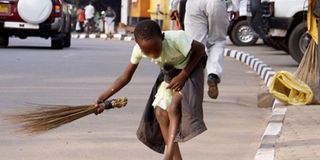Britain crafts laws against slavery in modern times

A girl cleans a street in Kampala. PHOTO | FILE |
What you need to know:
- Modern slavery is an illegal industry fetching an estimated $35 billion annually.
- The estimated number of people enslaved in Britain is anywhere from 4,426 to 4,600.
A week ago today, British legislators met in a committee room to take evidence on a bill to deal with a problem presumed long gone: Slavery.
To those who might wonder whatever happened to the Slavery Abolition Act 1833 in the British Empire — which other nations have done — the answer is that slavery never ended. It just mutated.
“The slavery we talk of today is not the slavery of old. There are no chains, there are no manacles. Every day we walk down the street we could walk past people who are psychologically trapped by slavery,” TheYorkshire Post quoted Dr Mick Wilkinson of the University of Hull saying.
The proposed legislation is Modern Slavery Bill. Slavery and Organised Crime Minister Karen Bradley said if passed it will be the first law of its kind in Europe.
Slavery and attempts to abolish it have been around as long as human beings have. Publicly available information shows the first successful but short-lived ban was by Chinese Qing Dynasty, 221-206 BC. Mauritania was last to abolish slavery in 2007.
Between last October and June, the Australia-based Walk Free Foundation published a progress report titled Global Slavery Index. It’s a 2013 estimate of the number of enslaved people in 162 countries.
The report, a first of its kind, says an estimated 29.8 million persons are enslaved, 76 per cent in ten nations. The researchers’ methodology is rather complicated to go into here.
Briefly, the nations were rated on prevalence and absolute numbers. The lower range of estimate is 28.3 millions and the upper 31.3. The 29.8 is the mean of the two.
INDIA'S ABSOLUTE NUMBERS
Topping the list on prevalence is Mauritania, followed by Haiti, Pakistan, India, Nepal, Moldova, Benin, Cote d’Ivoire, The Gambia, and Gabon.
India heads on absolute numbers, followed by China, Pakistan, Nigeria, Ethiopia, Russia, Thailand, the Democratic Republic of Congo, Myanmar, and Bangladesh.
Before the mutation, slavery was by descent, arising from conquest or trade.
Slaves were, therefore, at a whim of their owners, largely to provide free labour. They would form a social class or caste, often discriminated even if they freed or bought their freedom.
These days capture is rare and confined largely to underage by rebel groups or corrupt governments with recruitment problems. Trade, a la the Atlantic and Indian Ocean, has been replaced via human trafficking.
Other forms of slavery include bonded labour. Individuals take loans to pay through labour. Conditions take almost indefinite periods. So is debt-bondage. Then there’s migration bondage, payment to travel for a job and handover so much money. Sex slavery follows this mode. The list of tactics is endless.
Common denominators are that vulnerable people provide labour and money while living miserably under conditions controlled by others. Threats and inflicting dire consequence remain the main enforcement weapons.
Modern slavery is an illegal industry fetching an estimated $35 billion annually.
Like all other criminal activities only governments can stymie it. The estimated number of people enslaved in Britain is anywhere from 4,426 to 4,600, not much by global standards. Yet legislators are seeking enhanced enforcement of anti-slavery laws. It’s a good example to other nations. After all, this is the era of human rights.




